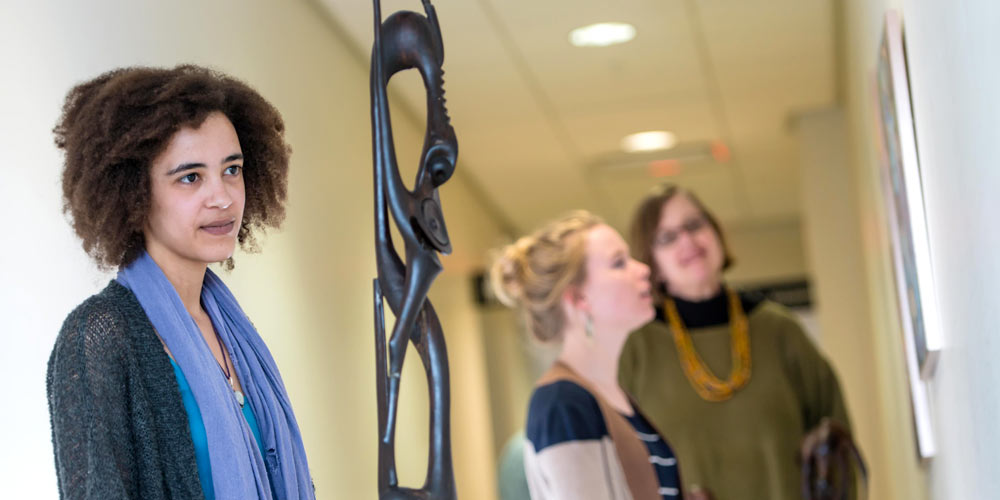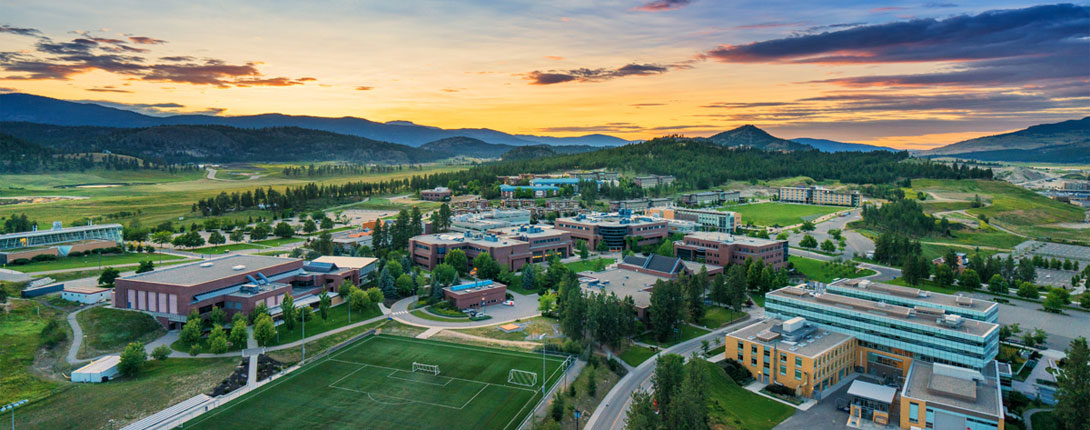Inquire
Hussein Keshani
Art History & Visual Culture Program Coordinator
250.807.9770
hussein.keshani@ubc.ca
Hussein Keshani
Art History & Visual Culture Program Coordinator
250.807.9770
hussein.keshani@ubc.ca
Bachelor of Arts (BA)

Study with world-class researchers who love teaching and sharing their knowledge. Take advantage of opportunities to work with them on innovative research projects, including 3-D modelling, app design, and local heritage institutions.
Combined with the appropriate blend of electives, the major can be used to pursue a variety of graduate and professional programs in areas such as art history, museum studies, education, library sciences, law, urban planning, architecture, public administration and management.
Art History and Visual Culture offers students a dynamic opportunity to learn about the world’s diverse traditions alongside world-class researchers who conduct research in Africa, South Asia, the Middle East, Europe, Indigenous America, Canada and the contemporary global art scene.
UBC Okanagan’s liberal arts degree prepares students for global citizenship by integrating foundational knowledge with interdisciplinary opportunities in social justice, sustainability and Indigenous content. Students who earn a BA degree graduate with a broad range of knowledge and the ability to think critically, be creative, problem solve and communicate effectively.
Put your classroom learning to the test with Co-op job placements throughout the region and beyond. Co-op helps you to gain beneficial skills such as how to build your resumé, apply for jobs, expand your professional network and earn money to pay for tuition.
UBC Okanagan’s Art History and Visual Culture program delves into the heart of human experience and identity, and its tangible expressions of cultural values, religious beliefs, and political agendas. The program offers a variety of global perspectives for exploring art and visual culture with course offerings on the arts of South Asia, the Middle East, Africa, Europe, and the Americas.
Students in the program explore and analyse diverse forms of art and visual culture, while focusing on developing critical thinking and writing abilities. They examine “high” art, pop culture, architecture, everyday objects, performance and aesthetics in their cultural and historical contexts. Cross-disciplinary approaches that draw from literary and cultural studies, gender and women’s studies, history, the digital humanities and anthropology are employed as well.
Pursue a Bachelor of Arts (BA) degree with either a Major or a Minor in Art History and Visual Culture. Another interesting option is the Combined Major, which can currently be taken with Creative Writing, Cultural Studies, or English. BFA students can easily complete a minor as well.
The program is a practical option for students who are continuing on to professional programs or graduate studies.
You will have the opportunity to immerse yourself in the world’s artistic heritage and contemporary art scenes.
UBC Okanagan’s Art History and Visual Culture courses address topics such as digital art history, historical and contemporary global art and architecture; art in Canada; art and popular music; global Surrealism; Latin American art; art, literature, and gender in the Islamic World; and art, fashion, and performance in Africa.
Sample courses:
View course descriptions for the 2020-2021 academic year. Browse all Art History and Visual Culture courses and descriptions in the Academic Calendar.
The following links take you to Art History and Visual Culture program details in the Okanagan Academic Calendar, a comprehensive guide to all programs, courses, services, and academic policies at The University of British Columbia:
Bachelor of Arts (BA) in Art History and Visual Culture
Find out more about how to declare your major.
Communications and Rhetoric Certificate
Students can receive a Certificate in Communications and Rhetoric by completing 15 credits through courses from four thematic interdisciplinary and relational clusters, and a final capstone project. This is an add on to any major; some credits can be double counted.
Learn about graduate studies
Prospective master’s and PhD students interested in working with faculty in the area of Art History and Visual Culture can do so through Interdisciplinary Graduate Studies (IGS) in the Digital Arts & Humanities theme.
For your application to be considered, you’ll need to do three things:
Then, UBC will take a closer look at your application. We’ll read your Personal Profile to get a sense of who you are and what you’ve achieved. We’ll also look at all of your Grade 11 (junior level) and Grade 12 (senior level) courses, paying special attention to the courses that relate to the degree you’re applying to.
Find your specific requirements at you.ubc.ca
Students are encouraged to declare their major in Art History and Visual Culture at the end of their first year in order to take the prerequisite second-year courses. Refer to the Academic Calendar for required courses.
Application Deadlines
Plan ahead to ensure you meet important deadlines and other target dates listed at you.ubc.ca.
Tuition Fees
UBC Okanagan’s fees compare favourably with universities of the same high calibre. See Financial Planning for helpful resources, and add up your first-year costs with our Cost Calculator.
Apply to UBC at you.ubc.ca—there are just five steps in the application process. Soon you could be studying at one of the world’s top universities.
Check out the steps to apply to UBC, and be sure to choose “Okanagan campus.”
Or let our Student Recruitment & Advising experts guide you: call 1-877-807-8521.

Earn a UBC degree respected by employers around the globe, and secure a career in a museum or gallery, or as an art critic or buyer. Or continue your education to work in professions such as teaching, curating, law, or architecture. UBC graduates from the Art History and Visual Culture program have abilities to analyse and interpret form, technique, iconography and the historical function of art.
Co-operative work-placement opportunities exist for all students completing a Bachelor of Arts degree. Earn a degree and relevant, paid work experience at the same time. Apply through the Co-operative Education Office in September of Year 2 or Year 3 of your BA degree program.
The UBC Okanagan Arts Career Apprenticeship Program (UBCO ACAP) connects upcoming arts, humanities and social sciences graduates from the Irving K. Barber Faculty of Arts and Social Sciences and the Faculty of Creative and Critical Studies with Okanagan-based employers for one-year, paid, early career opportunities.
Prospective master’s and PhD students interested in working with faculty in the area of Art History and Visual Culture can do so through Interdisciplinary Graduate Studies (IGS)
Co-supervisory arrangements with other program areas are also possible. Please contact individual faculty members for further information.
Learning experiences beyond the classroom help prepare you for a career and life after university. Expand your horizons while studying abroad, conducting meaningful research, or working in the community with fellow students.
Get a financial boost to start your research experience and help pay for travel and other expenses. Merit-based cash awards also look impressive on your resumé.
Find out what students, faculty, and alumni have to say about UBC’s Okanagan campus: ourstories.ok.ubc.ca.
The University of British Columbia is a global centre for research and teaching, consistently ranked among the 40 best universities in the world. In the psychology program at UBC’s Okanagan campus, you gain all the benefits of attending a globally respected university while studying in a close-knit learning community.

On the first day of university, faculties offer “Meet the Faculty” sessions where you can get to know the Dean, professors, and the staff who provide student support. It’s all part of UBC Okanagan’s new student orientation: CREATE.
Attend an orientation tailored to your needs as an aboriginal student, domestic student, international student, or student living in residence. You can even register your parents for an orientation that includes a workshop and campus tour.
Take advantage of the many opportunities to get involved and stay active—from workout space in the new Hangar Fitness Centre, to athletic courts, intramurals, fitness classes, and varsity athletics.
Learn more at Sports and Recreation, which includes links to fitness facilities, sport clubs, intramurals and recreation programs, as well as the nationally ranked UBC Okanagan Heat varsity teams that compete in the Canada West Universities Athletics Association.
Meet new people while living in a study-oriented environment with easy access to academic and personal support.
UBC Okanagan offers modern residence living surrounded by hiking and biking trails. One of the newest residences, Purcell, includes a rooftop patio that offers a panoramic view of the campus and the Okanagan Valley.
Find out more about living in residence at you.ubc.ca.
UBC’s Okanagan campus borders the dynamic city of Kelowna, a hub of economic development with a population of more than 150,000 people—the fourth fastest growing population in Canada. In fact, the Okanagan Valley is rated one of the best communities in Canada to grow your business.
More than 160 buses travel daily from campus to key locations such as Kelowna’s cultural district and thriving downtown waterfront. The campus is two minutes from the Kelowna International Airport, one of the Top 10 busiest airports in Canada.
UBC Okanagan is situated within the First Nations territory of the Okanagan Nation, whose spirit of stewardship for the land is reflected in the university’s respect for sustainability.
A diverse natural region with sandy beaches, beautiful farms, vineyards and orchards, and snow-capped mountains, the Okanagan Valley features sweeping stretches of lakeside and endless mountain trails for biking and hiking.
Explore the Okanagan lifestyle at you.ubc.ca.